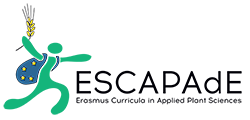Genetic resources and food traceability
1. Overview on genetic resources, their conservation and importance for agriculture and food production
2. Genomics and molecular methods, including a view on the main ‘omics’ techniques (genomics, transcriptomics, proteomics and metabolomics) to apply for the analysis of genetic resources for food science and for food traceability and security: (a) Genomics, genome structure and organization, molecular markers and genome analysis, nucleic acid extraction’s methodologies, advanced DNA sequencing and amplification’s technologies, molecular techniques and omics technologies (Transcriptomics, Metabolomics and Proteomics) for the analysis of seeds, plants, and derived products. (b) Data analysis through statistical methods and models and interpretation of the results.
3. Case studies: several examples of application of the most advanced technologies, the omics approach, in food science will be illustrated trough theoretical lessons, laboratory practical classes, discussions on scientific articles, seminars and visits. Examples include analysis of volatile compounds for the authentication of wine and derived products, analysis of specific DNA sequences for food safety and quality, genomic and metabolomic analyses to assess the authenticity of cereals and cereal-based products (i.e. pasta), DNA-based methods for authentication of meat and meat products, and of edible plant oils.
1. Overview on genetic resources, their conservation and importance for agriculture and food production
2. Genomics and molecular methods, including a view on the main ‘omics’ techniques (genomics, transcriptomics, proteomics and metabolomics) to apply for the analysis of genetic resources for food science and for food traceability and security: (a) Genomics, genome structure and organization, molecular markers and genome analysis, nucleic acid extraction’s methodologies, advanced DNA sequencing and amplification’s technologies, molecular techniques and omics technologies (Transcriptomics, Metabolomics and Proteomics) for the analysis of seeds, plants, and derived products. (b) Data analysis through statistical methods and models and interpretation of the results.
3. Case studies: several examples of application of the most advanced technologies, the omics approach, in food science will be illustrated trough theoretical lessons, laboratory practical classes, discussions on scientific articles, seminars and visits. Examples include analysis of volatile compounds for the authentication of wine and derived products, analysis of specific DNA sequences for food safety and quality, genomic and metabolomic analyses to assess the authenticity of cereals and cereal-based products (i.e. pasta), DNA-based methods for authentication of meat and meat products, and of edible plant oils.
At the end of this course, students should be able to:
a) integrate information (genetic resources, their use for food production and safety and quality of food)
(b) design analytical approaches to investigate the safety and quality of raw materials and finished food products and to recognize their strengths and limitations
(c) evaluate the potentiality of innovative molecular techniques for traceability of food.
o Lecture
o Lab practice
o Discussions
o Visits
o e-learning
o Seminars
Oral discussion on the course contents and critical lecture of a scientific paper
February-June (Spring Semester 2019/20)
Master Degree Food and Beverage Innovation and Management
